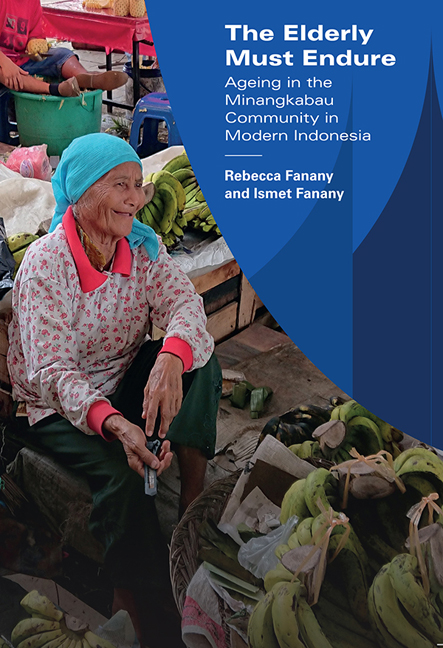Book contents
- Frontmatter
- Contents
- Acknowledgements
- Map of Indonesia
- Map of West Sumatra
- Map of the Village of Koto
- Aminah's Family Tree
- 1 Introduction
- 2 Ageing in the Past and Present
- 3 Adat Traditions and the Elderly
- 4 Religion and the Elderly
- 5 Language and the Elderly
- 6 Ageing in the Village
- 7 Ageing in Padang
- 8 Ageing in the Rantau
- 9 Ageing in an Institution
- 10 Ageing and Cultural Consonance
- 11 The Elderly Must Endure
- Afterword
- References
- Index
- About the Authors
3 - Adat Traditions and the Elderly
Published online by Cambridge University Press: 16 May 2019
- Frontmatter
- Contents
- Acknowledgements
- Map of Indonesia
- Map of West Sumatra
- Map of the Village of Koto
- Aminah's Family Tree
- 1 Introduction
- 2 Ageing in the Past and Present
- 3 Adat Traditions and the Elderly
- 4 Religion and the Elderly
- 5 Language and the Elderly
- 6 Ageing in the Village
- 7 Ageing in Padang
- 8 Ageing in the Rantau
- 9 Ageing in an Institution
- 10 Ageing and Cultural Consonance
- 11 The Elderly Must Endure
- Afterword
- References
- Index
- About the Authors
Summary
ADAT IN MINANGKABAU
The term adat in Indonesian means “traditional law and customs”. The cognate term in Minang is adaik, which has the same meaning. Adat is used throughout this book because it is most frequently used in writings about Indonesia in English and has no exact equivalent. Adat is an aspect of culture that is well known throughout Indonesia, where each ethnic/linguistic group has its own customs and traditions that relate to its specific social and historical context. Adat existed long before the modern state of Indonesia, and most regions have traditional interpretations of locally relevant, culturally enforced law that relate to issues like land ownership, property rights, and inheritance; marriage, divorce, and other aspects of family law; life course events of local significance (birth, death, circumcision, and so forth); and many other elements of culture that reflect the traditional interpretation of shared experiences in a given location or among members of a specific group. Modern law, which was first instituted by the Dutch colonial government and which has been revised and updated in the context of the independent nation of Indonesia, addresses some of the issues to which adat also applies, although these two types of law have generally been seen as separate. Adat relates more to individuals’ relationship to their own ethnic culture, while modern law defines a similar relationship to the state (see Lindsey (2008) for a discussion of the nature of the law in Indonesia).
In recent years, the concept of “local wisdom” (kearifan lokal) has become part of the national intellectual paradigm and is often applied in situations where it is felt that local ways may have value in addressing some issue or solving some problem that is of current concern. This is in contrast to a historical tendency in Indonesia to adopt approaches and solutions that come from the Western intellectual environment without much consideration of whether they apply in the local context. Much of the content of local wisdom derives from adat, which is seen as providing a socially acceptable approach or suggesting potential solutions that draw on the shared experience of the community where they are to be implemented.
Since the establishment of regional autonomy, local culture has become more significant at the regional level.
- Type
- Chapter
- Information
- The Elderly Must EndureAgeing in the Minangkabau Community in Modern Indonesia, pp. 52 - 74Publisher: ISEAS–Yusof Ishak InstitutePrint publication year: 2018

